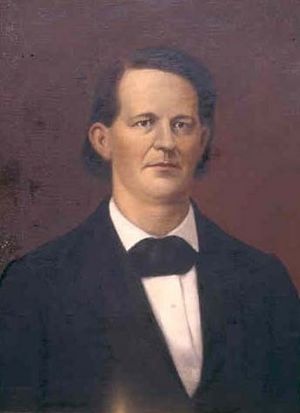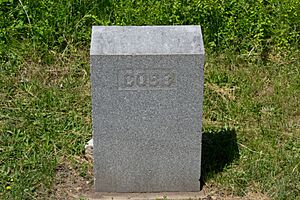Thomas Reade Rootes Cobb facts for kids
Quick facts for kids
Thomas Reade Rootes Cobb
|
|
|---|---|

T. R. R. Cobb by Horace James Bradley
|
|
| Deputy from Georgia to the Provisional Congress of the Confederate States |
|
| In office February 8, 1861 – February 17, 1862 |
|
| Preceded by | New creation |
| Succeeded by | Position abolished |
| Personal details | |
| Born | April 10, 1823 Jefferson County, Georgia |
| Died | December 13, 1862 (aged 39) Fredericksburg, Virginia |
| Nationality | American |
| Relations |
|
| Alma mater | Franklin College |
| Military service | |
| Allegiance | |
| Branch/service | |
| Years of service | 1861–1862 |
| Rank | |
| Commands | Cobb's Legion Cobb's Brigade |
| Battles/wars | American Civil War |
Thomas Reade Rootes Cobb (born April 10, 1823 – died December 13, 1862) was an American lawyer, writer, and politician. He also served as an officer in the Confederate States Army during the American Civil War. He was killed in action at the Battle of Fredericksburg. Thomas Cobb was the younger brother of Howell Cobb, who was also a well-known figure in the Confederacy.
Contents
Early Life and Education
Thomas Cobb was born in 1823 in Jefferson County, Georgia, in the state of Georgia. His parents were John A. Cobb and Sarah (Rootes) Cobb.
He went to Franklin College, which is now part of the University of Georgia. He graduated in 1841. While there, he was a member of the Phi Kappa Literary Society, a student group focused on debate and literature. After college, he studied law and became a lawyer in 1842.
Family Life
Thomas Cobb married Marion Lumpkin. Her father was Joseph Henry Lumpkin, who was the Chief Justice of the Supreme Court of Georgia.
Thomas and Marion had several children, but only three lived to adulthood: Callender (Callie), Sarah A. (Sally), and Marion (Birdie). Thomas Cobb also founded a school called the Lucy Cobb Institute. He named this school after a daughter who passed away shortly before the school opened its doors.
Political and Legal Work
From 1849 to 1857, Cobb worked as a reporter for the Supreme Court of Georgia. This job involved writing down and organizing the decisions made by the court.
Cobb was a strong supporter of secession, which meant he believed Southern states should leave the United States. He was a delegate, or representative, at the Secession Convention, where Georgia decided to leave the Union.
He wrote an important book about the law of slavery in 1858. This book, called An Inquiry into the Law of Negro Slavery in the United States of America, was one of the most complete writings supporting slavery at the time. It used ideas from history and the science of the time to argue that slavery was a natural and necessary part of society.
Cobb also helped create the University of Georgia School of Law. He was part of a group that wrote Georgia's first official set of laws, known as the Georgia Code of 1861. This was a big step because it was one of the first times a U.S. state tried to write down all its laws in one organized book. The original Georgia Code had parts that supported slavery and racial inequality. After the Civil War, these parts were changed or removed to make the laws fair for everyone.
Cobb served in the Congress of the Confederate States. He was in charge of the Committee on Military Affairs for a while. He also helped write the Confederate constitution, which was the set of rules for the new Confederate States.
Military Service in the Civil War
In the late summer of 1861, Thomas Cobb created a military unit called Cobb's Legion. He became a colonel in the Confederate States Army on August 28, 1861. His Legion was part of the Army of Northern Virginia, a major Confederate army. They fought in many battles and suffered many losses, especially during the Maryland Campaign.
Cobb was promoted to brigadier general on November 1, 1862. However, the Confederate Congress did not officially approve this promotion before his death.
Death and Legacy
Thomas Cobb was killed during the Battle of Fredericksburg on December 13, 1862. He was hit in the leg by a Union artillery shell. He died from bleeding because the shell damaged a major blood vessel in his thigh. He is buried in Oconee Hill Cemetery in Athens, Georgia.
The T. R. R. Cobb House, where Thomas Cobb and his wife Marion lived, is now a museum in Athens, Georgia. The house was moved and restored, and it now helps people learn about his life and the history of the time.
Works by Thomas R. R. Cobb
- Digest of the Statute Laws of Georgia (1851)
- Inquiry into the Law of Negro Slavery in the United States (1858)
- Historical Sketch of Slavery, from the Earliest Periods (1859)
- The Code of the State of Georgia (1861)
See also
 | Claudette Colvin |
 | Myrlie Evers-Williams |
 | Alberta Odell Jones |


